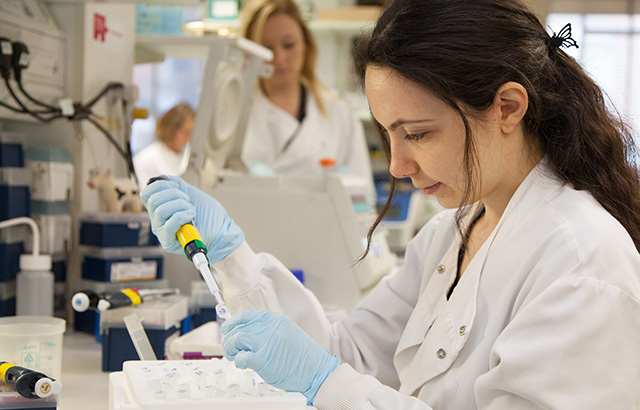Research team awarded £20m to tackle cancer’s biggest questions
A global research team involving scientists from Queen Mary University of London have been awarded £20 million by Cancer Research UK in an initiative that aims to answer some of the biggest questions facing cancer research.

Cancer Research UK’s Grand Challenge brings together the brightest scientists from around the world and from different disciplines to find solutions to cancer’s toughest challenges and save more lives.
Dr Stuart McDonald from Queen Mary’s Barts Cancer Institute is a co-investigator in the team STORMing Cancer, consisting of collaborators from the US, Canada, UK and Israel, and led by the University of California, San Francisco. This pioneering team has been awarded the funding to uncover how chronic inflammation promotes the development of cancer and identify novel ways to prevent cancer developing in high-risk patients with chronic inflammatory diseases.
Inflammation is the body’s first defence against infection and injury; however, chronic inflammation- where the immune system fails to limit itself and inflammation is inappropriately sustained- is involved in 20-25 per cent of cancers globally.
Inflammation and cancer
It is currently not fully understood how chronic inflammation drives cancer development. The team aims to discover the mechanism behind this process in a number of different cancers and use this information to develop novel therapies that target or adjust their signals to return the tumour to a ‘normal’ or ‘benign’ state.
Dr McDonald will be focussing on Barrett’s oesophagus, an inflammatory condition (mainly caused by acid reflux) in which the normal cells (epithelial cells) that line the oesophagus are replaced by ones that look like those in the bowel. Barrett’s oesophagus is common in the UK, and those with the condition have a 40-fold increased risk of developing oesophageal cancer compared with the normal population.
Dr McDonald from Barts Cancer Institute, Queen Mary University of London, said: “Chronic inflammation confers a significant cancer risk to patients and despite advances in our knowledge of the genetic damage to epithelium in cancer, we know little of how the environment that surrounds the epithelium promotes or even prevents such changes. This work will allow detailed analysis of these processes and in conjunction with the rest of our team, we will be able to investigate potential routes towards a novel therapeutic strategy.”
Predicting the risk of progression to cancer
It is difficult to identify patients with Barrett’s oesophagus who have a high risk of developing oesophageal cancer. Currently, all patients are placed under surveillance to monitor any further changes in the cells, which involves endoscopies at intervals ranging from every two to five years. This is an invasive and expensive procedure and does not currently inform about future cancer risk.
As part of the Grand Challenge, Dr McDonald hopes to identify changes that occur which promote progression from Barrett’s oesophagus to cancer, by examining samples from the same patients over time. This is hoped to lead to the identification of novel features that may be used to predict which patients are at high risk of developing oesophageal cancer.
Iain Foulkes, PhD, Cancer Research UK’s executive director of research and innovation, said: “Individually, these research teams are among the best in the world in their respective fields. By bringing them together across borders, Grand Challenge is enabling these teams to think bigger and establish new and exciting collaborations. The scale of the funding reflects the opportunity we see in harnessing their ability to understand and tackle cancer.”
More information
- Study postgraduate courses in cancer at Barts Cancer Institute, Queen Mary University of London
Related items
For media information, contact:


